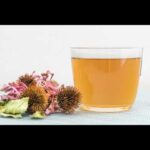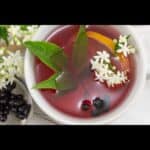What Is Barley Tea?
In Asia, barley tea, also known as Korean barley tea or roasted barley tea…
….is a popular hot and cold beverage. The drink is known as boricha in Korea (bori meaning barley and cha meaning tea). In Japan, the drink is known as mugicha, while in China, it is known as damai cha or mai cha.
The main component of it is (of course) roasted barley. Barley is a whole grain farmed all over the world. Because of its high fiber content and moderate flavor, barley is popular among healthy eaters. The grain is simple to use in recipes and is used to make bread and cereal. It is also fermented and used to make some alcoholic beverages such as beer and distilled beverages. Barley tea’s flavor is typically characterized as mild and nutty. However, some Korean tea manufacturers use roasted maize in their recipes to increase sweetness. Oksusu bori cha is a tea that contains corn.
How to Make It
The most convenient approach to make it at home is to buy barley tea bags or already roasted (ready-to-brew) barley online or at a shop. The product will be available in several Asian markets and health food stores. If you want to prepare it from home, you’ll need to start by roasting barley. Barley can be roasted on the stovetop (without oil) or in a preheated oven. Roast the grain until it’s lightly browned but not burnt.
To prepare it:
- Bring a medium saucepan (eight cups) of water to a boil with roughly two teaspoons of the toasted barley.
- Reduce the heat to a simmer and cook for 15 to 20 minutes, depending on your preference. Remove from the heat and set aside to cool.
- Reheat the barley tea to serve as a warm tea drink, or chill the barley water to serve cold.
- For additional taste, some tea users add a tiny quantity of lemon or sweetener (such as honey or sugar) to their tea. Cardamom and other spices can also be added to the hot or cold beverage.
Does Barley Tea Contain Caffeine?
It is not a conventional tea since it is not produced from the leaves of the Camellia sinensis plant, like black tea or green tea are. It is made entirely of barley and has no caffeine. As a result, barley tea has no caffeine.
It Gives Benefits For Health
Barley tea includes a variety of vitamins, minerals, and biological components that have been linked to improved health. It includes vitamins A and C, as well as antioxidants that aid in the elimination of free radicals, amino acids, and melatonin, all of which benefit general health.
It’s Good for Digestion
It is a natural antacid that can help reduce the uncomfortable symptoms of heartburn and acid reflux illness. Barley grains are high in fiber, which helps to relieve constipation and promote healthy bowel motions. Barley tea’s antioxidants can help alleviate stomach cramps and nausea. Drink a cup of barley tea 30 minutes before each meal for the optimum digestion outcomes.
Boosts Your Immune System
Barley tea is high in vitamin C, which can help protect your immune system against sickness and decrease the duration of the common cold and flu. Vitamin C promotes the formation of white blood cells, which aids your body’s ability to fight illnesses. It also includes antioxidants, which help to remove free radicals, which may cause cell death and premature aging, as well as serious illnesses like cancer.
Researchers discovered five phenolic chemicals in barley tea, including quercetin, which inhibits oxidation, which causes cell death, in a study published in Bioscience, Biotechnology, and Biochemistry. These phenols are particularly designed to degrade peroxynitrite, which has been linked to both cardiovascular and neurological disorders.
Improves Blood Flow and Circulation
Regularly consuming barley tea can assist increase blood flow and avoid major cardiovascular disorders such as blood clots and heart attacks. Scientists discovered that consuming high concentrations of barley tea in dosages of 250 milliliters resulted in improved blood flow in a research published in the Journal of Nutritional Science and Vitaminology. Blood fluidity was evaluated using a microchannel analyzer, and it was discovered that drinking barley tea reduced the transit time of whole blood.
The inclusion of the flavonoid alkylpyrazine is responsible for barley tea’s favorable blood effects. Because blood may flow more readily through arteries and veins, drinking barley tea on a daily basis reduces the risk of blood clots. Clots and blocked arteries can also cause heart attacks and heart disease, which can be avoided by improving blood circulation.
Was this helpful?
Hi there! I’m a food enthusiast and journalist, and I have a real passion for food that goes beyond the kitchen. I love my dream job and I’m lucky enough to be able to share my knowledge with readers of several large media outlets. My specialty is writing engaging food-related content, and I take pride in being able to connect with my audience. I’m known for my creativity in the kitchen, and I’m confident that I can be the perfect guide for anyone looking to take their culinary journey to the next level.








![Preparing [champ chicken sausage] - raw sausages boiling in a pot and cooking in a pan.](https://milkwoodrestaurant.com/wp-content/uploads/2026/02/image-1-4-150x150.jpg)
